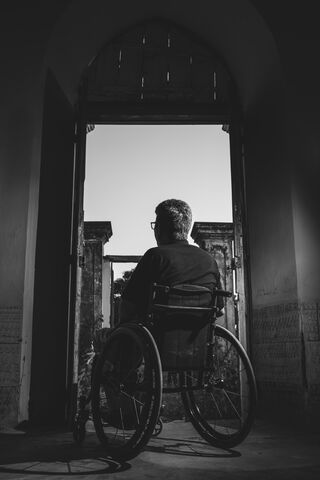Health
Does Being Ill Have a Rock Bottom?
How do you keep trying when you know you will not get better?
Posted February 25, 2022 Reviewed by Ekua Hagan
Key points
- Chronic illness may deplete a person's ability to cope.
- We view illness as a battle to restore health, but seeing it as a "fight" may not be the best way to look at illness.
- Instead of latching onto an idea of how healthy one should be, it can help to not push illness away.

I came home from the hospital deeply subdued. I felt like a dog who’s been yelled at and is cowered, being as still as possible.
My mind was dull with the sense of defeat that this hospitalization had brought. Certainly, the hospital fixes things. But there is little to celebrate in getting knocked down and helped up again and again.
Hitting rock bottom
This time was particularly bad. Two days before, I had received my second hip replacement. As with past surgeries, this was billed as life-changing. And with the new surgical approach now practiced, there were no strict limitations on movement allowed afterward. Just avoid what hurt and what was clearly too much. Pain and weakness would provide all the guidance I needed. Or so I was told. It turns out there is one limitation after this surgery: You cannot sit in deep chairs. This places your knee too high above your hip and will stress the prosthetic joint when you try to get up.
Unaware of this, when I arrived home the day after surgery, I promptly plopped myself on a deep couch. Upon standing, my new hip came out of its new socket. My roar of pain was bestial. Fear quickly set in, as I knew this would not be fixed for hours and would entail much jostling, which would cause more pain. And so it was.
They eventually knocked me out, put my hip back in, and sent me home. This is when the subdued, rebuked feeling began. I’d had many surgeries and hospitalizations over the 15 years of my illness. Usually, they left me angry at the setback and the unnecessary problems, which inevitably followed. Mostly I’d be eager to get back to regular life. This time was different.
After each trip to the hospital, there was always something left to rehab, medicate, or if not fix, somehow adapt to. This time I felt as if being chronically ill had finally given me more than I could handle. If there was a pool from which you draw the strength for adaptation, the pain and fear of my recent episode had drained it dry. I could no longer just move my leg this way or that, add another pill and another exercise, or simply discard yet another part of my life like a pair of old shoes. If there was a rock bottom for patients, I had hit it. I now realized that no amount of effort would get me back to my previous, healthy self.
Where to go when you feel depleted?
And as with rock bottom for alcoholics, I needed to surrender. I could no longer adapt, adapt, adapt. All along, I had gone through the paces of getting better, always with a sense that I would one day awaken healthy. I knew now that I would not be getting better. How could I muster the motivation needed for the constant push towards health, knowing I was as chronically ill? Must I continually recover and never be cured?
Just a few days before the episode with my hip, I had noticed a few stories about Buddhism in an online writing forum I subscribe to. These were classic brief tales with simple, yet profound lessons. I liked them and felt the spark of interest I’d had when as an adolescent I found the Buddhist section in the public library. The clarity, depth, and accessibility were there just as they had been at another time of need more than 40 years earlier when, as a teenager, I had broken with my family religion.
Although not exactly a bolt of lightning, a new perspective seemed to open. The place to begin in Buddhism is to find your extremes and move away from them. Striving for a state of health I did not have was such an extreme.
Was there a way to maintain whatever efforts I needed to keep myself healthy, while not focusing on fixing what could not be fixed? The aim would be to avoid latching onto some idea of how healthy I should be. By neither pulling towards health I did not possess, nor pushing illness away, I could find a middle road of adaptation without the emotional rollercoaster.
Negativity also takes work.
In truth, I had become an angry and resentful man, unhappy with the way life had unfolded for me. I no longer wished to put in the tremendous effort to maintain this negativity even in the face of more bad luck (which, sadly, was still to come). My career as a psychiatrist was in tatters and any sense of a normal life, even for an average 60-year-old, was lightyears away.
As I had done 40 years ago (and many times since), I read Buddhist teachings and spent a few minutes a day practicing meditation. A year later, I added therapy with a psychologist as my physical problems had progressed. For now, I could say that I do not take medical news so personally. My efforts at obtaining some level of health do not generate resentment as before. I believe this is due to my efforts being focused on how I actually am, a chronically sick person with significant limitations.
As a psychiatrist, I cannot help but wonder what implications my small journey has for our approach to illness, especially chronic illness. We are a “get-er-done” society. We value victory and the fighting spirit. Perhaps chronic illness is not the place for such cheerleading.
Why must we win the fight?
If outcomes in illness were not so infused with a sense of winning and losing, could we face the inevitable swings in our fortune with a greater sense of steadiness? You do not need to be a Buddhist to find a balanced approach. But we do need to change our sense of illness as a kind of competition with the prize being restoring you back to full health.
As clinicians, we should communicate a message of understanding of how illness can take over anyone’s life. In addition to telling patients that we will help them, we should reassure them that we will keep abreast of new treatments, remain available for problems outside of appointments, and most importantly, that we will go through the illness with them. This last message alone leads to great hope. Not hope of a cure, but hope that all will be done, that they will not suffer unnecessarily, and crucially, that they will not be alone in the work of illness.




